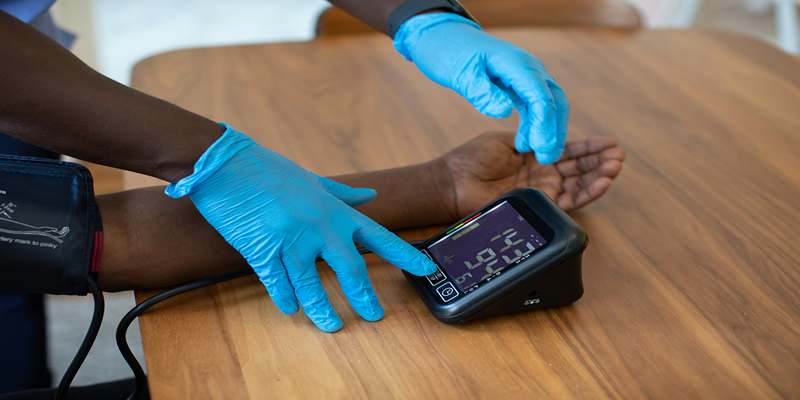The use of AI is becoming a reality in almost every sector of business, and the healthcare industry is no exception. AI has brought a revolution in medical professions and has had a great impact on the face of patient care and diagnosis and treatment. It is not a novelty that artificial intelligence has found its use in the healthcare sector in an effort to enhance its effectiveness and accuracy. Thus, healthcare automation is continuously altering the very nature of the existing jobs in the healthcare sector because the medical workers continue to learn about the new technologies. So, more awareness needs to be raised on how it is likely to affect doctors, nurses, and other healthcare practitioners.

AI’s Role in Medical Professions
How AI Is Changing Healthcare Workflows
AI is gradually being integrated into numerous medical procedures and is beneficial in hospitals and clinics. Patients’ records are being scanned by algorithms, diagnosis is done with the help of algorithms, and the probability of a certain disease is being forecasted by algorithms as well. The application of artificial intelligence in the healthcare sector assists doctors, nurses, and other staff in minimizing paperwork, handling patients’ information, and enhancing the overall organizational flow. By using machine learning models, doctors and researchers are capable of identifying patterns that are hidden in medical images, and this process can be done within a short span of time. Also, the use of artificial intelligence in chatbots and virtual assistants offers the preliminary consultation and saves time for doctors and nurses. The relevance of AI in enhancing the delivery of health care services will continue to expand since the application of AI in health care is promising to revolutionize health care systems in terms of its effectiveness in the course of its delivery.
AI in Medical Professions: Enhancing Efficiency and Accuracy
The application of AI in medicine is slowly but surely changing the approach to diagnosis and treatment of diseases. Due to the algorithms in artificial intelligence, medical data can be processed within a shorter time and even diagnose some patterns that could not be diagnosed by experts. Some of the applications include diagnosis of diseases such as cancer and heart diseases through the use of radiology imaging software. Besides, it helps to select the proper treatment course with regards to the patient’s genetics and environmental factors. These developments help the medical practitioners to come up with the right decisions while minimizing the chances of human mistakes. AI is revolutionizing patient care because of the improvements it brings in terms of the accuracy and efficiency of doctors and specialists.
Healthcare Job Automation: The Rise of AI in Medicine
Medical Tasks Being Automated by AI
The use of artificial intelligence in healthcare is brought about by the ability to take charge of tiresome processes. Scheduling of appointments, coding, and even billing are some of the administrative tasks that are now being done through artificial intelligence. RPA helps in the handling of the electronic health records by minimizing the manual input of data. AI can be used to accurately diagnose patients through the interpretation of images, such as x-rays, microscopy images of tissues and organs, and blood tests. Technological tools such as the da Vinci Surgical System are used to improve precision in complicated surgeries. However, despite the use of AI in performing these tasks, human supervision will always be critical in terms of delivering accurate outcomes and making sound decisions that would benefit the patients.
The Benefits and Challenges of Healthcare Automation
AI has been used in various aspects in hospitals, for example, resource management, patient surveillance, and hospital functioning. However, there are some issues, which relate to the job losses due to automation or dependence on artificial intelligence in decision-making. Although AI has its strength in terms of efficiency, it still cannot understand people’s feelings and emotions, which are important in the field of medicine. The issues of ethical nature, such as data privacy and the problem of algorithm bias, have to be solved to avoid negative consequences. Still, the new technological advancement in AI is a challenge that healthcare workers have to face in the delivery of patient-centered care.

AI in Doctor’s Work: Changing the Role of Physicians
AI as a Support System for Doctors
Contrary to the belief that AI is an enemy to doctors since it will replace them, it is instead a valuable asset. In the medical field, decision support systems make it easier and faster for physicians to analyze vast medical data for better diagnosis. Virtual assistants in healthcare are used to assist the doctors in their work by presenting the patient history, suggesting treatments and solutions, and alerting the doctor of possible drug interactions. AI also impacts the accuracy of surgeries by helping in robotic surgeries, thus minimizing the role of human error. It helps doctors to improve their performances instead of replacing them and frees them up to deal with patients and diagnoses. In the future progress of AI, it will remain a key player in the provision of quality healthcare.
How AI Is Impacting Medical Decision-Making
AI techniques analyze the data collected in order to make prognosis about the disease, as well as its evolution and treatment. For instance, AI technologies assist oncologists in identifying the appropriate types of treatments for cancer depending on the patient’s DNA makeup. AI also helps to predict those who may be at risk; thus, appropriate intervention can be taken at the earliest. It is, therefore, clear that, though AI helps in decision-making, it is not beyond error and requires supervision. Clinicians need to augment these insights with their expertise in order to arrive at the final diagnosis. The incorporation of artificial intelligence technology into decision making processes in the clinical setting means that the health care profession is moving towards evidence based and patient-centred care that is still under the control of the physician.
Conclusion
The integration of AI in medical professions is reshaping healthcare, enhancing efficiency, accuracy, and patient care. Healthcare job automation is optimizing hospital operations, reducing manual tasks, and assisting in complex procedures. AI is not replacing doctors but serving as a valuable tool that enhances decision-making and surgical precision. As AI continues to advance, healthcare professionals must adapt by acquiring technical skills and embracing lifelong learning. While AI brings transformative benefits, human expertise, empathy, and ethical considerations will always remain essential in medicine. The future of healthcare lies in the collaboration between AI and skilled medical professionals.
